BestReviews is reader-supported and may earn an affiliate commission. Details
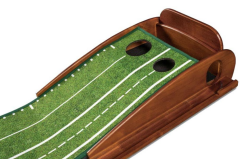
Thanks to the automatic ball return and attractive design, users love this mat for practice time.
Thanks to the automatic ball return and attractive design, users love this mat for practice time.
Attractive wood finish. Two holes of both regulation and reduced sizes enable users to hone various putting skills. Green has white stripes leading directly to holes, allowing for visualization of pure strokes. Gutter behind the holes catches errant putts and automatically returns balls.
Users agree it's overpriced. Can be difficult to get it to lay flat.
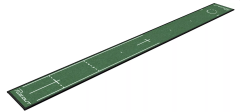
A well-priced mat with a slim design that is a straightforward choice for putt practice.
A well-priced mat with a slim design that is a straightforward choice for putt practice.
Lightweight and affordable. Width of 0.82 feet and length of 7.9 feet. Easily rolls up into a compact size for storage or transport. Unrolls into a flat, crease-free putting mat surface. Reads 10 on stimp meter—ideal for medium-to-fast green practice.
Simple mat that doesn't have advanced features that some players may desire.
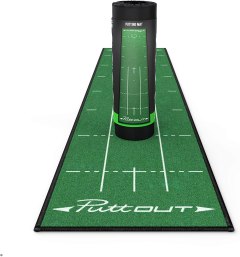
Purposefully designed to mimic the field, this durable option is suitable for both beginners and professionals.
Purposefully designed to mimic the field, this durable option is suitable for both beginners and professionals.
Nonslip thanks to a thick TPR rubber bottom. Designed with alignment lines, foot markers, target holes, and a putt-out base. Informational markings help keep score during practice. Medium-to-fast 10 stimp meter reading. Mat can be stored easily for travel or when not in use.
Top of the putting mat doesn't realistically represent actual green.
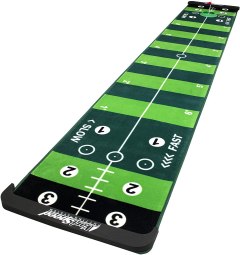
A great system that helps with precise putting.
A great system that helps with precise putting.
Putting speeds are subtle but noticeable and can be controlled by adjusting the surface. Ball “tracks” through the nap, making it easy to determine sidespin, skid, and more.
Nap must be brushed between putts to keep ball from following earlier track.
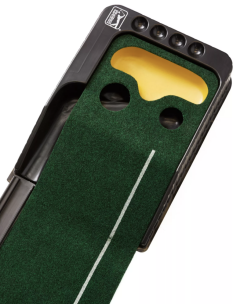
A simple and affordable putting mat that features a user-friendly ball return ramp.
A simple and affordable putting mat that features a user-friendly ball return ramp.
At a 9-foot length, users can practice multiple putt lengths. Two target holes of both standard regulation and reduced sizes. Gutters at back of the mat catch errant putts. Convenient ball return ramp is helpful for preventing constantly bending over. For both indoor and outdoor use.
Quality doesn’t match some other choices. Very basic line markings—nothing advanced.

We recommend these products based on an intensive research process that's designed to cut through the noise and find the top products in this space. Guided by experts, we spend hours looking into the factors that matter, to bring you these selections.

Ask good golfers what prevents them from becoming great — and great golfers from becoming pros — and the majority will say putting. Mastering the skill of putting can be one of the most trying parts of golf.
So the next time you’re on the driving range, hitting ball after ball with your new driver, don’t forget to spend some time on the putting green, too. Practicing putting regularly will help you develop a consistent stroke, which will translate into a better score on the course.
For those times when you can’t travel to the grass practice green at your favorite course, you can still spend time on this key skill. Get a putting mat, and you can practice putting anytime and anywhere.

Think about where you’ll be using the putting mat the majority of the time. If you have a dedicated space for practicing, you may want a larger mat covering 20 or 30 square feet. Not having to roll up the mat after each session makes a large artificial putting green appealing.
No matter what size of space you have available, it’s very likely you’ll be able to find a mat shape and size to fit it. There are long and thin mats, square mats, and everything in between.
Figure out the shape and size of the area you have available, and then look for a corresponding sized mat that has the features you want. If you have a tiny area for practicing, remember that even a small mat can help you develop a great putting stroke.
If you’re struggling to develop a consistent putting stroke, teaching-style putting mats work well. These mats have grid lines and other helpful markings on them.
You can use the markings to line up your stance and ball address, so you’re on line from the start. If you aren’t lined up properly, you’ll see it immediately on these mats. Do this repeatedly on the mat, and you’ll be able to translate the proper stance and address to the course through muscle memory.
Some mats even have lines leading to the hole, allowing you to envision the putt’s track. This may help you keep the putter head squared up to the ball throughout the backswing and follow-through.

Once you’ve found the perfect size mat to practice putting, here are some other features you’ll want in your model.
Ball speed: The stimp rating is a measurement of how fast the ball will roll on a grass green. Some putting mats will list a stimp rating. You then can try to match the speed of the mat to the stimp rating you usually encounter on your favorite golf course.
Portability: A mat should roll up to a small size if you want to move it between home and the office. Rolling up tightly is a key feature if you must store the mat in a closet after using it, too.
Ball return: With certain mat models, the mat will kick the ball back to the starting point when you hit it in the hole. This will save a bit of time as compared to retrieving the ball yourself.
Multiple holes: When the putting mat is large enough, it may have two or three holes. This is a nice feature when you want a bit of variety in your putting practice options.
Putting green mats are available in a variety of price points. As a general rule, larger mats cost more than smaller mats, but other factors play a key role in price.
The least-expensive artificial putting greens will cost $10 to $30. They won’t have a lot of coverage area, they won’t have natural breaks, and they’ll have only one hole. But they’re nice for those looking for a starter putting mat.
Putting green mats in this range cost $30 to $80. These designs may have more than one hole and a simple uphill/downhill break. They’ll usually be long and thin, allowing you to practice putts of varying lengths.
The priciest putting mats will run $80 to $250. These may cover 20 to 50 square feet. They’ll often have a few breaks, multiple holes, and variable speeds. For those seeking the most realistic level of practice quality from a putting mat, these mats are great choices.
Additionally, huge artificial putting greens that you might install in your backyard can run as high as several thousand dollars. For this guide, however, we’re sticking with non-permanent putting mats that you can roll up and store after usage.
Once you own a putting mat, what drills should you do to gain the biggest benefit from it? We’ve collected some tips to help you have success with a putting mat.
Start with simple putts. If you’re just learning how to putt, focus on shorter putts first. It may seem boring, but learning to consistently hit two- to four-foot straight putts with confidence will improve your golf score.
Stick with short practice times. After 15 to 20 minutes, especially for a novice golfer, you may not receive much more benefit from practicing. You may have tired muscles and a tired brain after constant practice. Put the mat away and return later for another session.
Use shorter putts as a warm-up. If you have a long putting mat with multiple holes, don’t forget to work on short putts. Start your practice session with a couple dozen two- to four-foot putts, and then move on to longer putts.

Q. How does a putting mat compare to an actual grass green?
A. All putting mats are a little different, but mat manufacturers attempt to come as close to an actual grass putting green as possible. The mat cannot mimic slower putting conditions by taking on water like a grass green, for example. However, the speed of the putting mat should be close to an average grass green’s speed.
Q. Does it matter where I use the putting mat?
A. Some putting green mats are only designed for indoor use. Others can be used indoors or outdoors, although they should be stored indoors after use. Putting mats work best on a firm flooring, like concrete or tile. You can use them over carpet, but thick, plush carpet may cause an inconsistent ball roll on the mat.
Q. Does the putting mat have holes cut into it when it arrives?
A. Typically, a putting mat will have holes pre-cut into the material. Some holes will be extremely shallow, and the ball may pop out. Deeper holes will hold the ball inside more successfully. On certain models of putting mats, you may have to cut the hole yourself and purchase a cup separately.
Q. Can I create breaks in my putting green?
A. A break in a putting green is a slight downhill or uphill shape to the mat that causes the ball to turn, slow down, or speed up as it rolls. Some advanced putting mat models have varying thicknesses within the length of the mat to create breaks. If you have a completely flat putting mat, you can place a magazine or folded towel under the mat to change the angle and create a break.
Get emails you’ll love.
Learn about the products you’re wondering if you should buy and get advice on using your latest purchases.
BestReviews wants to be better. Please take our 3-minute survey,
and give us feedback about your visit today.
